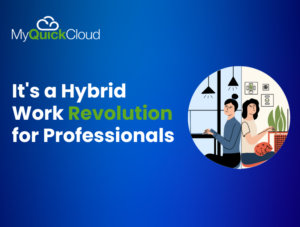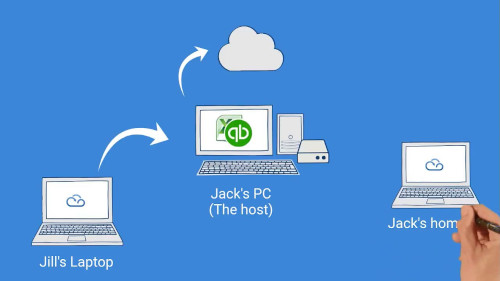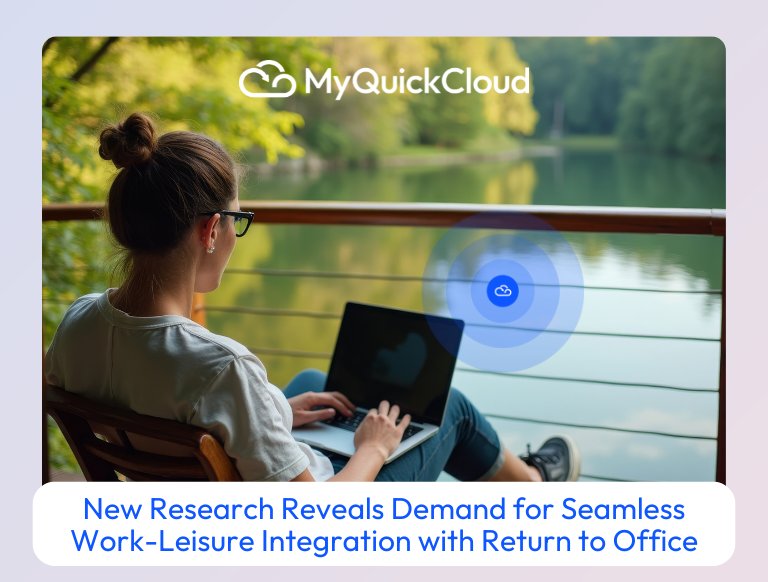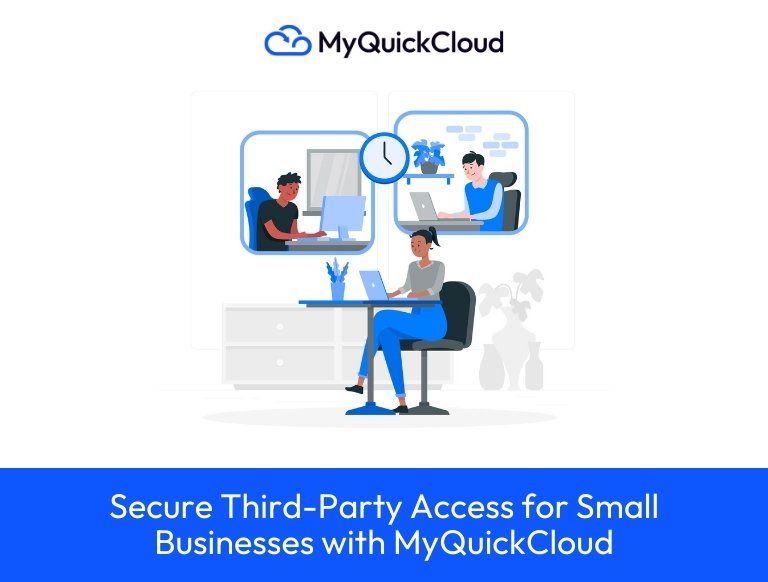Work-life balance has benefited from hybrid work, which has altered the professional landscape. A flexible and fulfilling lifestyle and a long-term career can be achieved with this innovative approach, which allows employees to split their time between the office and remote locations.
Work is performed in-person and remotely in this new type of arrangement. Organisations adapted to new ways of working during and after the COVID-19 pandemic, resulting in this model becoming increasingly prominent. Research conducted by Owl Labs found that almost half of UK employees prefer flexibility in their work schedules and say they would decline an offer if they had to work every day.
The purpose of this article from MyQuickCloud is to examine the many ways professionals can take full advantage of hybrid work, identifying real-life examples and exploring the fascinating concept of working remotely from another city or country, just like our client Zyla Accountants in this article.
A new approach to work-life balance
As a result of hybrid work, employees have greater autonomy in structuring their workdays. Flexibility is a powerful tool for balancing professional and personal commitments in the daily routine. In order to align their work commitments with their personal needs and priorities, professionals can choose specific days for in-office and remote work.
It is possible for working parents to plan their workweek to include remote days that coincide with their children’s important activities. It enables greater participation in significant moments, such as school events, sports competitions, or family outings, when work and family life are seamlessly integrated. Adapting to individual life situations, it transforms the traditional 9-to-5 schedule into a dynamic framework.
In hybrid work environments, professionals can also customize their environments to meet their comfort and productivity needs. Rather than being restricted to a designated office cubicle, people can decide where to work, including at home, at local coffee shops, or at coworking facilities such as WeWork, which has locations across the country.
It may be beneficial for an executive to work from a serene home office when completing critical tasks, especially in times of stress. Working from a coworking space, on the other hand, can occasionally be a refreshing change of scenery, inspiring creativity and fostering innovation. The flexibility in choosing workspaces allows professionals to create environments that not only improve productivity, but also contribute to their overall well-being.
Having reduced daily commutes is a liberating experience. In many cases, removing or minimising travel time can result in reclaiming valuable time from their day.
Thus, these freed-up hours can be spent nurturing personal well-being and passions. Eliminating the daily commute allows professionals to spend more time on activities like yoga, meditation, gardening, pursuing hobbies, or even lifelong learning. Essentially, hybrid work alleviates the physical and mental stress of daily commutes and opens up opportunities for personal growth.
Productivity Enhancement
Professionals who practice hybrid work are breaking free from rigid boundaries separating work from personal life. The concept of work-life integration is advocated instead, where personal and professional activities coexist harmoniously.
It may be beneficial to an entrepreneur to organize business meetings at a local park, not only to enhance networking, but also to transform professional interactions into leisurely ones. As a result of combining work with a jog or a picnic, this individual not only achieves professional goals but also nurtures his or her own well-being. Professionals can achieve multiple goals while maintaining a holistic approach to their lives by embracing synergy.
The work environment of these professionals can also be customized to maximize productivity. Creating a dedicated home office, minimizing distractions, and curating an environment that enhances focus may be essential to achieving this. A Stanford University study found that remote workers are more productive than their office counterparts.
Compared to traditional offices, remote work environments are less likely to experience interruptions. Boundaries can be created by professionals to minimize distractions. It is easier to accomplish more in less time when you are able to focus uninterrupted on your tasks.
Professionals have a unique opportunity to expand their networks on a global scale through virtual communication platforms, such as Zoom. It has become easier for people to participate in virtual conferences, webinars, and online events, regardless of their geographical location thanks to the virtual landscape.
Marketers from New York, for instance, can present marketing strategies to a global audience at industry summits in London. Newfound connectivity opens doors to international collaborations, partnerships, and opportunities. A broader network of contacts is now available to professionals, allowing them to cultivate relationships they might otherwise be unable to. As a result, the network becomes richer, fostering professional development.
Remote work from another city
Having the option to work remotely from a different city is an enticing prospect of this new way of working. It enables professionals to combine their work obligations with exploration of new destinations and cultures as part of the rising trend of digital nomadism.
Work hybrids and digital nomadism go hand in hand. The digital nomad lifestyle combines travel and work by allowing professionals to work from any location with an internet connection.
Suppose a software developer spends a month working remotely from Bali. The developer combines their professional responsibilities with exploring Bali’s natural beauty and vibrant culture during weekends and evenings. In addition to providing a fresh perspective on a new environment, the digital nomad lifestyle also provides the opportunity to immerse oneself in new experiences which can enhance one’s creativity and personal development. This is an opportunity to transform a typical work routine into something enriching and transformative.
Hybrid work, however, also accommodates professionals seeking longer stays in one location, as opposed to digital nomads. Individuals can work from a new city for an extended period, allowing them to establish a deeper connection with the area.
Working remotely from another part of the UK, often referred to as domestic digital nomadism, is becoming more popular and feasible. In addition to maintaining their employment in another city, many professionals are choosing to work in a more convenient location that is more personally appealing to them.
In order to improve their quality of life, professionals may work remotely from a different city or town. Relocating to a place with a lower cost of living, shorter commute times, or a more favourable climate may be an option.
A large number of domestic digital nomads choose to relocate to places where the cost of living is lower than in major urban centres. By doing so, housing expenses can be reduced, utility costs can be reduced, and everyday living can become more affordable. As a result of a lower cost of living, individuals will have more financial freedom to invest, save, or spend on experiences that enrich their lives.
For maintaining productivity and effectively communicating with your team, you must be agile when travelling to your employer’s headquarters. Hybrid work also means being flexible with your travel schedule and travel plans. You need to be prepared for quick travel in the event of an unexpected issue in the office, for example.
Several advantages are offered by online portals, such as Opodo, when it comes to finding the best options for a reasonable price. From the comfort of your home or while traveling, online portals provide a one-stop shop for searching, comparing, and booking flights. As well as saving you time, they can show you the best deals to ensure you arrive at work at the right time.
Factors to consider and challenges of Hybrid Working
Hybrid work comes with its own set of challenges as well as its advantages. It is imperative for professionals to maintain effective communication, keep an eye on cybersecurity, and balance work hours with relaxation and exploration. For remote work to be successful, internet connectivity must be reliable and fast. Domestic digital nomads must ensure they have access to a reliable Internet connection wherever they are located since not every area has the same level of internet infrastructure.
It is important that domestic digital nomads adhere to their employer’s policies as well as any contractual obligations and legal requirements. To address work-related concerns, keep your employer or clients in the loop. In addition to transportation costs, lodging fees, and dining out fees, frequent travel can also result in added travel expenses. Budgets should account for these costs.
Individuals can reshape their work-life balance with hybrid work, revolutionizing the professional landscape. The optimization of schedules, customization of workspaces, and redefining work environments can help professionals achieve new levels of productivity and well-being. In addition to its flexibility, it enables you to work remotely from different cities, allowing you to blend work and travel seamlessly. It is now possible to create lifestyles that combine work and fulfillment in a way that is unprecedented and meaningful as professionals embrace these opportunities.
While this new way of working poses challenges and considerations, they are not insurmountable. Planning ahead, communicating effectively, and committing to well-being and productivity are keys to navigating this landscape successfully. As long as these challenges are addressed head on and adapted to the changing work environment, it can remain a rewarding and sustainable way of doing business.





